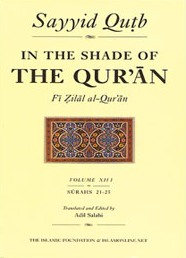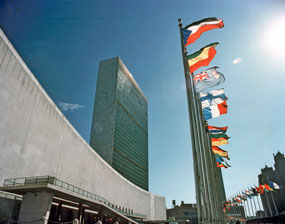
In our Islamic environment we have become used to classifying discourses according to several modes: there is the extremist mode with its representatives, and there is the moderate mode, with its own conspicuous figures and their supporters. Similarly, there is a type of collective intellectual denial, that might be termed a third mode, a ‘diluted style’, with its representatives so designated perhaps in spite of themselves.
THE SALAFIST discourse makes no great departure from this classification for it has its voices that speak in its name and work on its behalf, some of them dubbed extremist, others listed in the ranks of the moderates.
But what is less obvious, when these modes of discourse are exposed to the mechanism of cultural categorisation, is that the difference between extremism and moderation will remain a matter of degree, not of type for as long as these modes drink from the same system of knowledge with its own historical invariables. This is because the viewpoints produced within this mode – be they moderate or extremist – must remain bound to these invariables in loyalty to them. You might put it this way: both modes derive their existence as forms of knowledge from their faithfulness to these invariables.
It surely goes without saying that the discourse’s conclusions, opinions and interpretations will stay within the bounds of these modes, with the differences remaining confined merely to degree and prone only to divergence within a specific period of time. In other periods they will also be susceptible to convergence or even be identical in response to the several givens of the overall context. This is because the difference in degree is dependent upon how far this mode of discourse is capable of widening to meet the abiding preoccupations of elements within the society. It is equally capable of contracting, not to the same degree but perhaps much faster than the pace of expansion. One could say that there is a slow and minimal widening of the gap when measured against the general level of regressiveness dominating the enterprise and the initiative, and given the same elixir of cultural roots that either of the two modes derive from.
The difference between extremism and moderation is a matter of degree, not of type
If we were to ascribe those givens to the sacred ground of the religious Text, we would find that what defines the difference of degree between extremism and moderation is how far the Text is interpreted to satisfy questions of a specific circumstance. Consequently, the difference must remain marginal and unable to approach the true purposes of the Text, due to an inability to take on board the historical structural conditions under which the Text itself emerged. What results from this type of ‘specific-circumstance’ interpretation is an accommodation, a co-existence with an extremist view that appears to ‘suddenly’ emanate from one who is characterised as a moderate. Conversely, any co-existence with a moderate view that may emanate from one who is held to be an extremist is not, in my view, anything to be surprised about, for as long as either view draws from the same a-historical view of the Text.
One might say here that an essential differentiation (as opposed to one of degree) cannot be effected in human society if it be not through an epistemological rupture with that which, without it, grounds perceptions (which will vary in place of it) on a single trajectory. This line ranges from zero (the utmost degree of extremism) to the maximum (the highest degree of tolerance) and in between lie the various degrees of the discourse. These degrees permit viewpoints to transfer themselves between them – on the one hand in response to real-time political or social requirements, or on the other hand to the givens of the practical circumstance.
Even if it is a modern western term, it is possible to apply the concept of ‘epistemological rupture’ to the arena of the holy writ by adopting a structural approach that re-plants the Text within the historical date and purpose in which it originated. From this one can understand what the intention of that Text was when it emerged. Moderation and extremism are founded upon the same bases, both adjectives being no more than the result of individual interpretation of the Text. This is an interpretation that at best takes into account the givens of the actual situation and nothing but these. So, it is not surprising that it switches over to an opposite interpretation the moment the compelling circumstance ceases to be. Either that or it takes into account what the varying, practical conditions demand of it.
Rather than getting carried away in abstractions let us position ourselves for a while on facts as they are. Let us take an official Islamic principle such as jihad and then apply to it the aforementioned givens by making a comparison between two theoretically contradictory Islamic views. One of these views is held to be at the very cutting edge of extremism, while the other one is seen by some to represent the pinnacle of openness and tolerance. Despite their appearing to be diametrically opposed, in embarking upon their jihadist discourse they each of them draw from an a-historical viewpoint which is not mitigated by the fact that one of the two discourses stems from purely Salafist doctrinal starting points, while the other follows the Ash‘arī doctrinal legacy. By making such a comparison we will discover that the two views are in fact in complete accordance with each other where the duty of jihad in Islam is concerned, for all the theoretical divide between these two discourses.
What defines the difference is how far the Text is interpreted to satisfy a specific circumstance
The first wing of the comparison is the Qutbist vision, ascribed to Sayyid al-Qutb. He is seen as the spearhead of present-day jihadist extremism since his view on jihad is taken as Gospel by extremist Jihadist movements holding to the globalisation of offensive jihad,[1] the type that seeks out the enemy on their very own ground (that is, hostilities initiated upon nations and their secure societies).
Qutb founds his views on jihad on the fact that it seeks out non-Muslims on their own ground (i.e. their own countries). This can only be effected by occupying those states and transforming their systems by force, before going on to replace them with Islamic systems. When this is carried out, one can then leave the people free to identify with what they believe in. This is a total distortion of the meaning of religious freedom, since the mere fact of fighting non-Muslims on the claim that their systems impede them from adopting Islam constitutes itself an overt infringement of religious freedom.
Sayyid Qutb disseminated this view of his in a number of books. In his commentary entitled In the Shade of the Qur’ān we find that he interprets the Almighty’s words: There is no compulsion in religion by linking this with His statement And fight them until there is no more discord, unbelief and religion is only for God, and by pairing it with his own exegesis on the Almighty’s words: Discord is worse than killing. Such an interpretation is made to serve his own purposes, so that he can come to his conclusion which, in so many words, is that “acts of attacks against the Islamic doctrine, and harm inflicted because of them, and discord sown among believers are worse than attacks made against people’s lives. This is because Islamic belief is a value nobler than life itself according to this noble principle”.
In order to achieve his aim – the confirmation of offensive jihad’s legitimacy – he affirms off his own back that the Islamic faith is being attacked in ‘communist, pagan, Zionist and Christian lands’. The upshot of this is that the nations of the world are to be ranked as one single enemy united against Islam, and that Islam consequently has the right to make efforts to shatter the oppressive systems which seek to make man subservient to man. There is therefore nothing for it but to resist these oppressive systems wherever they are on the globe and initiate hostilities against them. Islam must crush them completely so as to propagate its system upon the world.
Sayyid Qutb’s view places Islam in a state of constant war with four fifths of humankind
This, then, is Sayyid Qutb’s view on the obligation of jihad in Islam. It is a duty which places Islam in a state of constant war with four fifths of humankind, out of a claim that these are warring against Islam, the aim being to empower Islamic propaganda in order for it to reach the people. Following that it leaves them free to follow it or not!
The other view we would like to go into now, by way of comparison, is the modernist view on the duty of jihad as recently presented by Dr. Salmān al-‘Awda. The Doctor is presently viewed as representing one of the most conspicuous examples of intellectual transformation within the Salafist circles, towards the ultimate level of openness and tolerance this circle can tolerate. This has enabled his ‘open’ viewpoint to capture the hearts of many, not only among the more open-minded Islamists but also by many of those considered to be pure liberals in outlook. Nevertheless, in an article of his entitled Offensive and Defensive Jihad,[2] he holds that
the aim of fighting in Islam is to protect the Islamic project, to protect the world, its community and the individual; this of course includes defence, but at times [the initiation of hostilities and attacks] may form part of this defence.
So we are now presented with another view that affirms that it is a Muslim’s right to initiate jihad against their opponents as some form of defensive measure! I do not know how he can ascribe offensive jihad to one of the demands of defensive jihad, unless the Doctor enlists the help of the famous sporting principle: “attack is the best form of defence”!
In order to establish the legitimacy of offensive jihad as representing another face of defensive jihad, the Doctor again affirms that
in the case of a nation that prepares for war and enmity and fighting, and is not bound by covenants, contracts, charters or agreements with the Muslims, whether secondary or international, it is not required that Islam leave the reins of initiative and initiation in their hands, and indeed the demands of protection may impose the need [to attack!] in advance, as one of the requirements of defence.
The question that imposes itself upon Dr. Salmān here would be something like the following: who is the one to establish that a nation has begun to prepare for war and hostilities? Is it the state, along with its intelligence-gathering apparatus and information capacities, or the people themselves? If he states that it is the state, then this conflicts with the primary charters of the United Nations which prohibit nations from launching aggression against each other whatever the apparent justification. This state would be obliged to defend its lands or its territory according to the ancient law.
But to attack a state or states on the pretext that they are preparing attacks upon them can only be a blatant infringement of international conventions, to the extent that it places that state wholly outside international law, and consequently in a state of war against the entire planet. But if he states that it is the people themselves who should be responsible for this task, this would constitute a leap against modern principles of political thought, and a regression of societies back to ancient imperial thinking, where raiding and enslavement were one of the more conspicuous justifications for its existence.

Suggested Reading
But there is another question no less difficult, logically, than this. This concerns how to define the nature of the people who will initiate this offensive/aggressive jihad. It is a legitimate question in the light of a modern political thought that embraces all humanity and affirms the principle of the independence of states within ethnic zones, each with their borders and independent systems of government, in a way that negates the existence of the Nation in the form that the Doctor intends. It forbids interference in each others’ affairs under any pretext whatsoever, including one that calls for Muslims to fight against others on the pretext of defending the Islamic project and its territories, or on the pretext of setting up a global Islamic system over the ruins of the modern world!
A state wholly outside international law is in a state of war against the whole planet
The implication of either view is the same – since the basis on which they depend is identical in either case. And this is so in spite of how the first one can be depicted as the ultimate in extremism, or the second as the ultimate in openness and civilized tolerance!
It is not my intention to depict Dr. al-‘Awda as a terrorist preacher, or claim that he espouses the Qutbist tendency, or the globalization of offensive jihad after the fashion of al-Qaeda. All I wish to ascertain here is that to adopt the traditional epistemological framework which refuses to re-plant its content within history, is liable to generate two views that on the superficial level might appear contradictory, but only to an unattentive mind. In fact these views may draw close to each other, as the tolerant view progressively narrows until it merges with the hard-line view, even unintentionally so as in the case of Dr. al-‘Awda.
[1] Offensive Jihad (jihād al-talab) as a concept is the cause of concern among many Muslim thinkers. But the concept is problematic due to textual support for it. The jihadist ideologue Sayyid Imam rejects the reticence concerning this type of jihad in that the scriptural texts are clear and unambiguous on the need to seek out the enemy and initiate hostilities, even in the enemy’s own lands. “The one who rejects the fact that Jihād al-Talab is a part of Islam”, he says, “such as those who say that Islam does not fight unless it is for defense or to repel transgression, then he is rejecter of the verses [Qur’ān IX,5 and 29] and Hadiths and the likes of them … And whoever acts unjustly in falsely interpreting such as what occurred from our Pious Predecessors (al-salaf al-sālih) concerning Jihād al-Talab and says that this was to repel transgression, then he has been misguided by far.” (Ed.)
[2] Salmān ibn Fahd al-‘Awda, جهاد الطلب وجهاد الدفع. The article may be read in the Saudi newspaper Okaz, August 28 2010, see http://www.okaz.com.sa/new/issues/20100828/Con20100828369721.htm . (Ed.)




